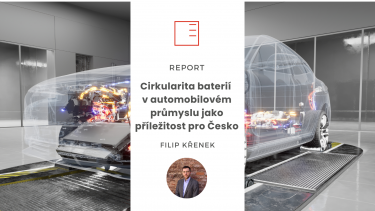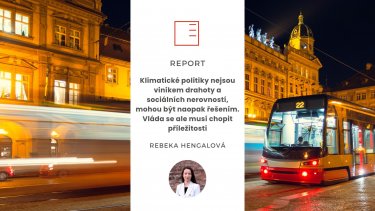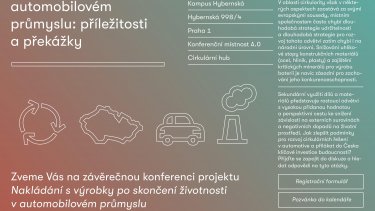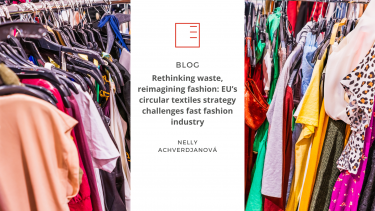Report | Battery circularity in the automotive industry as an opportunity for the Czech Republic
The report "Battery Circularity in the Automotive Industry as an Opportunity for the Czech Republic" addresses key issues in the development of the battery industry in the Czech Republic, with an emphasis on the circular economy, recycling and reuse of batteries. The study, which was produced in cooperation between EUROPEUM think tank and experts in the field of batteries and electromobility, shows that although the Czech market is still lagging behind in the development of battery production and recycling, its potential is huge - from raw material extraction to component production to battery recycling, which would significantly strengthen the resilience and environmental sustainability of the Czech economy.
Show more
Report | Climate policies are not the culprit of high costs and social inequalities, but can be the solution. But the government must seize the opportunity
This week, the Government will discuss in the third reading an amendment to the Emissions Trading Act, which also includes so-called household allowances. Under ETS2, these will charge for emissions from road transport and local heating - so they can help invest in infrastructure, renewable energy and support socially vulnerable groups. EUROPEUM Institute research fellow Rebeka Hengalová and others write.
Show moreConference | Circularity in the Czech automotive industry: opportunities and obstacles
The automotive industry has long been the driving force of the Czech economy, but is currently facing fierce foreign competition and challenges in the area of decarbonisation and sustainability. Despite its strategic position in the automotive industry, the Czech Republic still lags behind its neighbours in circularity and lacks a long-term strategy for the development of the sector. How can we improve the conditions for the development of circular solutions in the automotive sector and attract key investments of the future to the Czech Republic? Come join the discussion and seek answers to these questions!
Show more
Balkan Insight | City Heat: What Central European Capitls Are Doing To Keep Cool
With another heatwave expected this week following record temperatures in July, cities in Central Europe are belatedly taking action – but politics keeps getting in the way. Katarina Svitkova, an Associate Research Fellow at EUROPEUM Institute specializing on climate change, urbanism and sustainability, comments for Balkan Insight.
Show more
Blog | Prague passable - or clogged? The dilemma of sustainable transport in the city
Prague faces increasing dependence on intensive car traffic, leading to growing problems with traffic, parking and deteriorating quality of public space. The increased number of vehicles means not only pressure on safety and traffic fluidity, but also environmental risks associated with internal combustion engines. Despite growing public support for public transport and car traffic regulation, finding a compromise between individual convenience and urban sustainability remains a challenge.
Show more
BLOG | Rethinking waste, reimagining fashion: EU’s circular textiles strategy challenges fast fashion industry
A number of industries, including textiles, are now facing an increasing emphasis on sustainability. It is characterised mainly by one-off trends, which are linked to the frantic pace of the entire textile industry. The EU's Circular Textiles Strategy can be seen as a hope to address the situation. You can find out more about it in the blog written by our intern Nelly Achverdjanová.
Show morePolicy Paper | Securing Green Transition
Our Senior Research Fellow, Kateřina Davidová and Research Associate, Jonathan Lyons, in partnership with the Global Policy Research Group, have collaborated on a study that examines the secure and sustainable supply of critical raw materials (CRMs) that are key to green technologies. The study recommends a strategy for Sweden and the Czech Republic to ensure sustainable supply chains to help the transition to green technologies.
Show more
EU-Pacific Talks: In-EV-itable future of automotive industry: what is the role of the Pacific region
We would like to invite you to the debate called "EU-Pacific Talks: In-EV-itable future of automotive industry: what is the role of the Pacific region" in the EU-PACIFIC Talks series. The debate will take place online on Tuesday, May 30 at 13:00.
Show more
Prague Climate Academy
In 2023, the Green Europe team of EUROPEUM Institute for European Policy introduced a series of workshops aimed at communicating the topic of green transformation to the Czech public. The aim is to support journalists and civil society in developing public discourse on climate change and climate policies. Last year, the Prague Climate Academy focused on sustainability in transport. The topic of the first workshop was the decarbonisation of car transport in the context of electromobility. The second workshop focused on transport sustainability in the city of Prague. In 2024, we are following up with the topic of city adaptation to climate change. We will offer a series of discussions and workshops with experts on public space adaptation, blue-green measures, and public participation.
Show more

iDNES.cz: Cheap electromobility has been pushed back by Brussels. Batteries must be eco
Electric cars that do not emit dangerous emissions should slowly replace cars with combustion engines. An environmentally friendly replacement. But what about the production of their batteries? According to the EU, the entire life cycle of these batteries should be environmentally friendly, from production to use to disposal. What measures will be introduced, how will the sale of batteries be regulated and how will this affect their price? Our research fellow Michal Hrubý comments on the topic.
Show moreStaroměstské náměstí 4/1
Prague 1 - Staré Město
110 00
tel.: +420 212 246 552
email: europeum@europeum.org
https://www.europeum.org









